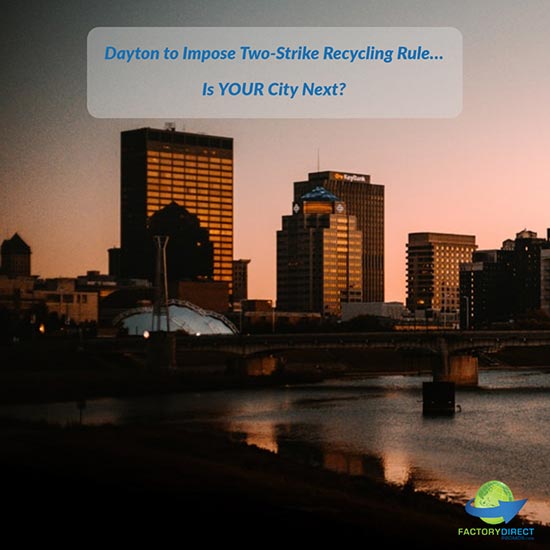Dayton to Impose Two-Strike Recycling Rule…Is There Another Option?

Dayton’s Two-Strike Recycling Rule Works to Decrease Wishcycling. Could Simplifying Recycling Work Instead?
Recycling seems easy enough, but that is just not always the case. Sometimes it’s very easy to identify if an item can be recycled, but other times it can be hard to make the call.
Trying to recycle non-recyclable items has a name. It’s called wishcycling. Tossing non-recyclable items in a recycling bin can be a costly error and officials in Dayton, Ohio are taking steps to address this all too common problem.
We can understand the city of Dayton’s frustration as we have heard it before.
Perhaps our recycling bags might be an answer as they have helped other municipalities.
Learn more about the steps soon to be taken in Dayton and what you can do to help streamline recycling in your community.
New Recycling Rules
Under the new policy, residents who place non-recyclable items in their recycling bin will receive a warning the first two times sanitation workers identify this error.
If a non-recyclable item is found in a resident’s recycling bin for a third time, that resident may lose their recycling bin altogether.
Managing the Waste Stream
This may seem extreme, but recycling is a business.
When non-recyclable items end up in a recycling bin those items can contaminate the recyclables or potentially damage or jam equipment that is not designed to process such materials.
Contamination can mean after all of the items are processed, the recyclable content cannot be sold.
Items like single-use plastic bags are notorious for causing shutdowns if they become tangled in the processing equipment.
In an effort to remove non-recyclable items and prevent the resulting problems, recycling facilities may choose to bring in more employees to sort items, but this drives up the cost.
Finding a Solution
Losing the ability to recycle can seem counterintuitive since a resident will likely throw their recyclables in the trash.
However, improper recycling leads to increased trash, because a contaminated batch will typically be hauled off to a landfill.
Any circumstances that lead to recyclable materials in a landfill is a problem, and that is why our reusable recycling bags may be the right solution.
Reusable recycling bags are a simple solution that is proven to increase recycling rates in apartments and multi-family dwellings. Our reusable recycling bags are alternatives to recycling bins that make recycling not only easy but effective and efficient as well.
Clear Communication
We have talked about our reusable recycling bags and how they can be used to increase multi-family dwelling recycling rates but they can also be used as educational tools.
Perhaps one of the biggest advantages of reusable recycling bags is the ability to print custom artwork on the bags. This enables the bags to relay helpful information which will ultimately make it easier for residents to recycle.
For example, custom reusable recycling bags can feature a list or a chart explaining items that can, as well as items that cannot be recycled. You can also include a website, social media handles, app download info, or other sources residents can reference to ask questions and learn more.
Improve Recycling Rates In Your Hometown
We are passionate about helping our customers and the planet.
We hold a variety of ISO certifications, we are one of the largest manufacturers of reusable bags, and we work very hard to reduce the use of single-use plastic.
We are proud of the work we do each day to help our planet and her people.
Reusable recycling bags are one solution proven to effectively promote recycling. Increased recycling rates reduce trash and litter while also helping communities better manage their waste stream. We have sold these recycling bags to municipalities across the nation.
We are ready, willing, and able to help you decrease wishcycling and increase proper recycling rates by helping you create your very own custom, reusable recycling bags!
Contact Factory Direct Promos today and ask for more information on creating reusable recycling bags.
Tagged



